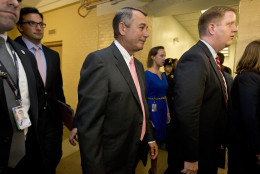government shutdown
-
The Office of Personnel Management released updated furlough guidance. The update includes 15 new additions and revisions for agencies and federal employees and what to do in case of a government shutdown.
September 30, 2015 -
A stopgap measure to avert a federal shutdown is set for a vote hours before a fiscal deadline would force the government to start the new year with closed doors.
September 29, 2015 -
Reps. Don Beyer (D-Va.) and Rob Wittman (R-VA) introduced the Federal Employee Retroactive Pay Fairness Act, which would secure retroactive pay for all federal employees during a government shutdown, regardless of furlough status.
September 29, 2015 -
Kathryn Medina, chief talent officer at APCO Worldwide and former executive director of the Chief Human Capital Officers Council, and Jeri Buchholz, strategic business development advisor for FMP Consulting and former chief human capital officer at NASA, count down the week's top federal stories with Francis Rose.
September 29, 2015 -
It turns out that not having a shutdown, which some said was an indicator of the end of democracy, is worse than having one. At least for some people.
September 29, 2015 -
The Senate has voted in support of a bill that would keep the government open until Dec. 11. The continuing resolution would hold funding at 2015 levels and includes money for Planned Parenthood.
September 28, 2015 -
If the 2013 government shutdown taught us anything, it's that the impact was felt way beyond federal agencies and their employees, says former DHS CHCO Jeff Neal.
September 28, 2015 -
The resignation of Speaker of the House John Boehner (R-Ohio) is either the solution to avoiding a government shutdown or a disaster in the making that will cause another shutdown or maybe both. David Hawkings, senior editor of CQ Roll Call, is watching the fallout from Boehner's announcement and tells In Depth with Francis Rose what he's seeing.
September 28, 2015 -
Being a federal worker is a lot like being a fat, juicy rabbit trapped on a fox-infested island. That's because to some foxy politicians, civil servants are fat, juicy, defenseless targets. Some are on the hunt all the time, while others come out in the fall — the official hunting season.
September 28, 2015 -
Republican leadership in both chambers of Congress thinks it has a plan to get the government funded by Sept. 30 and avoid a shutdown. Jeri Buchholz is strategic business development adviser for FMP Consulting and she explains to In Depth with Francis Rose how preparing for the worst while hoping for the best is valuable advice.
September 25, 2015 -
By now shutdown planning should be underway at your agency. If it happens, the economic repercussions will be widespread and the private sector will likely feel the biggest impact. Jeff Neal, senior vice president of ICF International, tells In Depth with Francis Rose how agencies can prepare, who will be most impacted and what we leared from the 2013 shutdown.
September 25, 2015 -
As the deadline to pass a federal budget nears, agencies are starting to send out instructions to employees on what to do in case of a government shutdown.
September 25, 2015 -
Congressional and budget experts say House Speaker John Boehner's decision to resign opens the door for a short-term continuing resolution that could be voted on early next week.
September 25, 2015 -
In-Depth host Francis Rose argues that Speaker Boehner's decision was both a bone toss and a punch in the mouth.
September 25, 2015 -
The Office of Management and Budget is working with federal agencies to "plan for the possibility" of a government shutdown. With less than one week until the end of the fiscal year, agencies and contractors are using lessons learned from the 2013 shutdown to inform their contingency plans.
September 22, 2015






